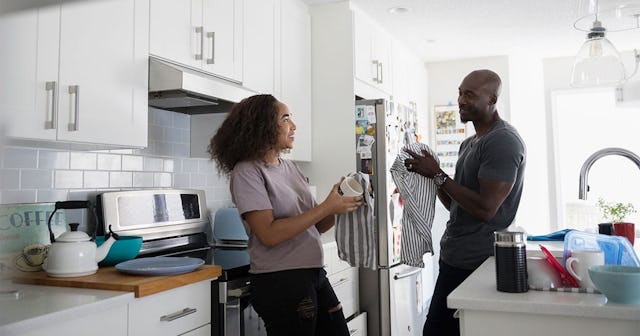Instead Of Shutting Your Kid Down, Try The 'What’s Your Plan?' Approach

Like many parents, I can see an accident happening several minutes before it actually happens. My daughter is swinging dangerously close to my fresh cup of hot coffee with her blanket cape. My son is riding his bike on the sidewalk but looking up at the sky rather than at the sidewalk in front of him. My daughter is pulling a chair up to the cabinet preparing to climb up, but I can see one of the legs has gone into a crack in the tile, making the chair wobbly. My son is talking and gesticulating wildly at the dinner table, his cup full of milk an inch from the table’s edge.
I know how all these scenarios are going to end. It has even been a running joke in my family that I’ll say, “Watch out, you are about to…” and then the thing I’m about to say will happen happens before I can even get a chance to get all the words out of my mouth. So my kids think I have the ability to predict the future. They take it semi-seriously actually, and will usually stop whatever they’re doing once I express a concern.
But sometimes I wonder if I am too overprotective. I do keep my distance when they’re trying something new, at least, but it’s hard to just sit there and keep my mouth shut when I know someone’s about to get hurt or spill something. But I worry that my intervening might make them dependent upon my foresight rather than their own.
I came across something on Facebook the other day that got me thinking about this again. The suggestion was that, rather than choosing the extreme of either pointing out what’s about to go wrong or zipping your mouth shut and letting the thing happen, you can simply ask, “What’s your plan?”
It’s kind of perfect. This approach allows parents to bring attention to the fact that perhaps the current trajectory of the situation is not the most desirable one, while giving the child a chance to evaluate the situation for themselves. It might be that they are perfectly in control and can prove as much to you. Or it might be that they really are out of control and need to check themselves, and this gives them that opportunity. Either way, asking a child “What’s your plan?” gives them the chance to exercise their autonomy and try out their planning skills to determine what they should do next.
I can see this working for me in just about all the scenarios I listed above, and then some. With my daughter looking to gain access to a higher cabinet, asking her what her plan is could get her to carefully assess the stability of the chair before climbing on it.
If my son is procrastinating with getting his homework done, I don’t have to nag him and tell him what I think is going to happen (that he won’t finish in time; that he’ll turn it in late; that he’ll get a bad grade). I can simply ask him what his plan is. Because he’s old enough to know the outcome of procrastination — me telling him all the potential outcomes is just nagging. “What’s your plan for homework?” allows him to consider whether he’s willing to risk turning that homework in late without me having to say as much. It puts him in charge of his own destiny.
In this age of helicopter parenting — or worse, lawnmower parenting — asking “What’s your plan?” is the antidote to over-involvement parents need. Although I have to be honest, I may never be able to stop myself from screeching at my kid to get away from my hot coffee — I’ve learned this lesson many times over that if I allow any excited behavior within a 10 foot radius of my coffee, the coffee is definitely going to get spilled. I guess that’s my plan for making sure I don’t end up losing my shit at my kids.
Thomas Barwick/Getty
But I can apply “What’s your plan?” to just about all situations where I think my kids might be heading in a direction where things won’t end well. This gives them a little bit of wiggle room to show me what their plan is. The cool thing is, questioning the plan can go in a positive direction whether your kid has a plan or not. If they really haven’t thought through the potential outcomes of whatever it is they’ve gotten themselves into, now they have been prompted to do that. But, if they have, now you get to hear the creative idea they had all along that you didn’t know about.
And, the likelihood is, just like that post I read on Facebook, our kids will probably surprise us more often than not. Just because they look like they’re doing something foolish, doesn’t mean they are. Or… it doesn’t mean they haven’t considered the potential fallout. Maybe they are perfectly aware of the potential consequences and want to do the foolish thing anyway. Maybe the failure is worth it to them. And maybe sometimes it’s our job as parents to let them learn in their own way, even when we’re sure we already know the outcome.